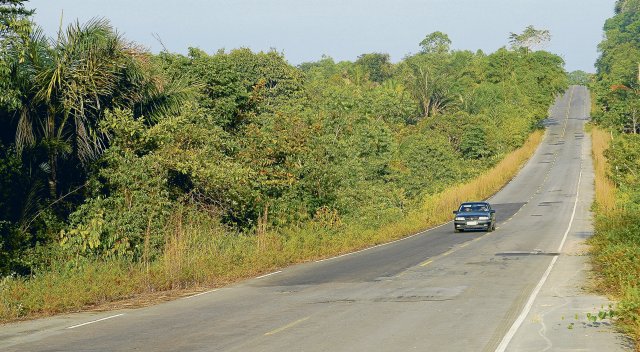The Transamazônica, Brazil’s second-longest road, was also created thanks to Didi Bortoluci’s long-distance truck journeys.
Photo: Imago/ PantherMedia / Günter Fischer
José Henrique Bortoluci was lucky. He is a “child prodigy” and leaves behind his parents’ simple circumstances to study sociology in São Paulo, three hundred kilometers away. He completed his studies with honors, went to Ann Arbor, the University of Michigan, on a scholarship, and received his doctorate there. Bortoluci is one of these educational climbers, a class refugee, who Annie Ernaux and Didier Eribon in particular have made a feature article topic. And in the tradition of Eribon, i.e. in the mode of the erudite essay that oscillates between narrative and reasoning, Bortoluci now also looks back on his childhood and youth as a working-class child in Brazil. However, his experiences are different. Although “Catholicism, patriarchal masculinity and local political machismo” still reign in Brazil’s interior, Bortoluci, unlike Eribon, experiences love, care and even familial pride in his class change.
In this sense, Bortoluci profiles himself as a kind of anti-Eribon – but above all, “What Remains of My Father” is a warm-hearted portrait of the long-distance driver José “Didi” Bortoluci, the writer’s father. José Henrique Bortoluci depicts its strengths and weaknesses with benevolent empathy. Didi is carting in the building materials for the mammoth Transamazônica project, the second-longest road in Brazil at over 4,000 kilometers, which crosses the country from east to west. He witnesses the extensive deforestation of the rainforest, but he doesn’t care about it. His concern is his family’s subsistence. He constantly misses birthdays, celebrations, even Christmas. He’s only at home for a few days, then he sets off again for a month and a half because another loan has to be paid off. Everyone in the family suffers from it. “When I was five years old, my father brought me a small plastic horse from one of his trips,” remembers Bortoluci. “Before he left, I hid the toy in his bag so he wouldn’t forget me.”
Didi likes to talk about his travels and experiences various adventures, at one point he even thought he was being followed by a UFO, but life on the road also leaves scars. He undergoes multiple operations, twice on the heart alone, and is then forced to retire – eventually he is diagnosed with colon cancer. Bortoluci takes care of his father, looks after him. As his condition worsens, he documents their conversations. He wants to counteract the “silence of the sources,” the “erasure of the testimonies of those who write their history with hands and feet, with spoken and sung words, with sweat and broken skin. I’m trying to enter the territory of the comings and goings of those who usually didn’t take photos, rarely kept diaries, didn’t give interviews, and weren’t filmed.«
As a result, he lets his father tell the story and supplements his words with his own memories, associations and reading material, adding small historical, political and sociological digressions to show that there is also something paradigmatic in this long-distance truck driver’s life.
However, Bortoluci does not make the mistake of discounting his father’s transcribed speech as a mere source. On the contrary, he even highlights them using italics, thereby allowing the stories to have their own space. That’s appropriate, because Didi always proves to be a lively narrator. His son has now become an educated citizen and has read everything from Roland Barthes to Neusa Sousa Santos, he now has to share that – perhaps to demonstrate to his father that São Paulo and Ann Arbor were not in vain. At times it reads a bit busy, sometimes vain and redundant. One or another academic loop makes it difficult to understand without providing any profound insights. Bortoluci could have relied more often on his narrative talent, which he obviously inherited from his father.
This book was written for him above all else, and it is a stroke of luck that Didi lived to see it published. He had feared that he would leave nothing behind and “one day end up as just another cog in the working class’s reproductive cycle.” The son can now calm him down. “My legacy is my father’s words – the words of the stories from my childhood and all the stories I heard in these last years as I helped care for his fragile body.”
Bortoluci’s focus on Didi explains a little why his completely overwhelmed mother, who raises little José all by herself and also cleans, remains so pale and hardly ever appears as an active person. This deficit is nevertheless noteworthy, also because the otherwise prudent author doesn’t seem to notice it at all.
José Henrique Bortoluci: What remains of my father. Translated from Brazilian Portuguese by Maria Hummitzsch. Aufbau Verlag, Berlin 2024. 175 pages, €20.
Become a member of the nd.Genossenschaft!

Since January 1, 2022, the »nd« will be published as an independent left-wing newspaper owned by the staff and readers. Be there and support media diversity and visible left-wing positions as a cooperative member. Fill out the membership application now.
More information on www.dasnd.de/genossenschaft
sbobet88 sbobet judi bola online sbobet88
